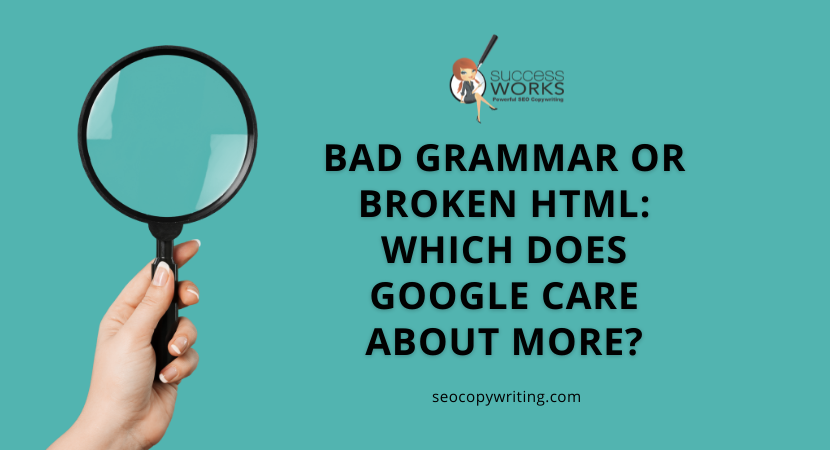
Imagine this…
You’re checking out a site that has two flashing, neon-red issues that need fixing:
- Multiple spelling errors and grammatical mistakes
- Broken HTML causing some funky spacing issues
You know that both issues can spoil the reader’s experience. Broken HTML can mess up how a page renders — and grammatical boo-boos are just…bad.
But, are both issues equally “bad” in Google’s eyes? Or, is one of the issues a bigger SEO deal?
In the immortal words of BuzzFeed, the answer may surprise you.
Here’s what Google says about broken HTML.
Google’s John Mueller, during a recent hangout, made the distinction between HTML (a technical issue) and content (a quality issue.)
Broken HTML is a pain, yes, but according to Mueller, “for the most part, we don’t care if HTML is broken or not.”
Sure, if your HTML is so bad that Google can’t crawl it, you WILL have Google issues.
But if you have the occasionally broken code snippet and weirdly-rendering page? You’re probably OK.
Are grammar and spelling more important than HTML? Yes.
According to Mueller, “I would almost say …like… spelling and grammar is probably for most websites a higher priority than broken HTML.”
Why? Because bunches of spelling errors make a page read poorly. It’s a quality issue — and Google only wants to reward high-quality pages.
Mueller said, “we try to find really high-quality content on the web, and sometimes it can appear that a page is lower quality content because it has a lot of …kind of… grammatical and technical mistakes in the text.”
Here’s the write-up by Roger Montti for Search Engine Journal if you want to read the entire scoop.
Plus, think about typos and grammatical issues from your prospects’ experience. How much will someone trust your firm if they see mistake after mistake?
Especially if you’re trying to establish yourself as an expert?
What do other SEO writers think about this news?
The news seems to have put a smile on many writers’ faces.
I posted the Search Engine Journal article to my SEO Copywriting Certification training Facebook group. The feedback was fun.
Michelle Lowery, a digital content editor, posted the single word, “VINDICATION!”
Helen McCrone, a freelance translator, pointed out machine-translated content is often chock-full of huge grammatical mistakes. If you’re translating your content into multiple languages, working with a person is a smarter bet than running your copy through translation software.
Deb Ferguson, the in-house writer for a law firm, commented, “Grammar and spelling issues make the company or writer seem less of an expert. They can ruin a company’s credibility in the industry and amongst its clients.”
That’s true. Can you imagine visiting a legal site with lots of typos? After all, if the legal firm can’t handle little details like site spelling and grammar — how can you feel good about them taking your case?
So yes, know that any broken HTML will eventually need a tune-up. But if it’s between rewriting pages with lots of spelling errors and fixing minor HTML issues, making the content better for your readers should win.
Every time.
What do you think?
Does this latest bit of Google news surprise you? Leave a comment and let me know!
You can also keep up with the latest SEO writing news by signing up for my newsletter, or joining the SEO Writing Tips Facebook group. See you there!







